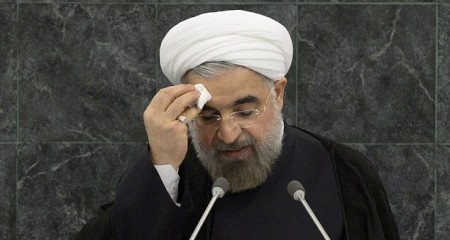PHOTO: President Rouhani “Whoever violates nuclear agreement will be loser on international stage”
In a shift of his public position, Iran’s President Rouhani has expressed concern over the implementation of the July 15 nuclear deal with the 5+1 Powers.
Rouhani told the Cabinet on Wednesday:
It is essential that everybody makes efforts according to national interests, rationality, and in executing and reinforcing JCPOA, as well as its utilization publicly in the region and the world….
[The JCPOA] is beneficial to all countries and promotes global peace, security, stability and development. Violating it will be detrimental to all and anyone who starts this, will be a loser in international stage.
He implicitly warned that Iran could set aside the limits on its nuclear program if Tehran was not satisfied: “If 5+1 [US, Britain, France, Germany, China, and Russia] wriggles out of its commitments, we are completely ready and capable to reach our desired point in a short time span.”
Complex Sanctions and Economic Worries
Rouhani has been an enthusiastic proponent of the JCPOA. He declared that, when it was implemented in January, it would soon be followed by a “JCPOA 2” for Iran’s economic recovery.
However, he soon faced a series of complications. From the Iranian side, the Supreme Leader rebuked the President, saying that a “JCPOA 2” should not be envisaged because of US dishonesty and deception. Ayatollah Khamenei even warned that he would take over supervision of economic planning.
Meanwhile, Rouhani faced the reality — long known, but obscured by both Iran and the 5+1 Powers when implementation was announced — that US sanctions would require months for full removal, given the complexity of restrictions from both the Executive and Congress.
The complexity of the process has brought caution from European banks and firms seeking to restore trade and investment with Iran, as they feared the prospect of US punishment. At a meeting in London, US Secretary of State John Kerry had to reassure European companies that they could return to “business as usual”.
Washington has also imposed new sanctions against Iranian individuals and companies linked to Tehran’s ballistic missile testing, which the US and European powers claim are in violation of a UN resolution passed at the time of the nuclear deal. And the US Supreme Court has frozen $2 billion of Iranian assets, ruling that families of victims of terrorism can sue for compensation.
The complications have jeopardized Rouhani’s hopes for Iranian growth after years of stagnation and recession, with a low point of a 4.6% fall in GDP in 2013.
Iran has increased oil exports by 40% since the start of the year, to almost 2 million barrels per day, and reached a 5-year high in production. However, further growth is dependent on foreign investment in oil and gas fields.
Investment may also be held up in other important sectors. Both a $25 billion deal with Airbus, announced in January, and this month’s $25 billion agreement with Boeing could be held up because of uncertainty over the sanctions and/or action by the US Congress. Development of Iran’s automotive industry, promised by the return of French companies to Iran, is also awaited.
Rouhani did not go into specifics on Wednesday. He just declared that “tapping JCPOA opportunities needs unity and synergy”: “We should use this opportunity for the development of the country and youth employment.”

